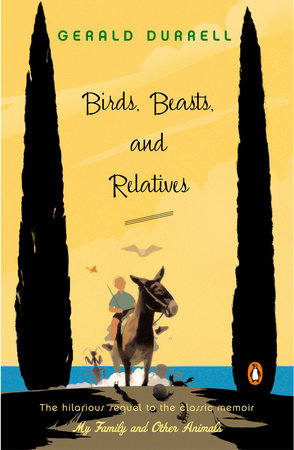Birds, Beasts, and Relatives by Gerald Durrell
Penguin
Pp. 245
This is the second
instalment of Gerald Durrell’s Corfu Trilogy in which he continues with stories
from the first book because the family say he has missed out all the best bits.
As it is the same time period as the previous work, we don’t really need
re-introductions, although it is interesting to see what the family members
thought of their portrayal.
Gerry introduces
several extra characters to us, mentioning Larry’s many friends who come to
visit, including Max and Donald, and Sven who plays the accordion. We are also
introduced to Countess Mavrodaki, “the recluse par excellence”., and we learn
about his tutors, such as George, and his final (for this book) tutor,
Kralefsky, a keen aviculturist (a person who keeps and rears birds) and a storytelling
fantasist. He also provides greater depth to characters we have already met,
and he describes his meeting with Theodore Stephanides, to whom the book is dedicated
‘in gratitude for laughter and learning”.
Gerry still
collects animals for his menagerie: an owl called Ulysses; three dogs; and
“there were rows and rows of jam jars, some containing specimens in methylated
spirits, others containing microscopic life. And then there were six aquariums
that housed a variety of newts, frogs, snakes and toads. Piles of glass-topped
boxes contained my collections of butterflies, beetles and dragon-flies.” I
remember things that I learned from reading these books as a child, such as the
fact that snails are hermaphrodites.
Gerry has a
child’s viewpoint and assumes that people and things exist for his
entertainment. He experiences bucolic activities such as harvesting olives, but
also is witness to live birth, and his reaction is less palatable. The
description is anatomical but also unpleasantly dispassionate, perhaps because
the human is foreign. “I was so used to the shrill indignation of peasants over
the most trivial circumstances that I did not really, consciously, associate
Katerina’s falsetto screams with pain. It was obvious that she was in some
pain. Her face was white, crumpled, and old-looking, but I automatically
subtracted ninety percent of the screaming as exaggeration.”
Furthermore,
his description of the gypsies is somewhat uncomfortable in a modern setting. “I
had always wanted to get on intimate terms with the gypsies, but they were a
shy and hostile people… and although they would allow me to visit their camps,
they were never forthcoming, in the way that the peasants were in telling me
about their private lives and their aspirations.”
When
Mother receives unwanted attention, and even a proposal of marriage, from a
‘disgusting old brute’, Captain Creech, she is naturally horrified and a little
bit afraid. The children all laugh and ridicule, and she counters, “When
there’s a real crisis, you children
are of absolutely no use whatsoever.” Yes, this is an amusing anecdote, but she
is a single woman in a foreign country in the 1930s with no respectable family
to protect her.

No comments:
Post a Comment